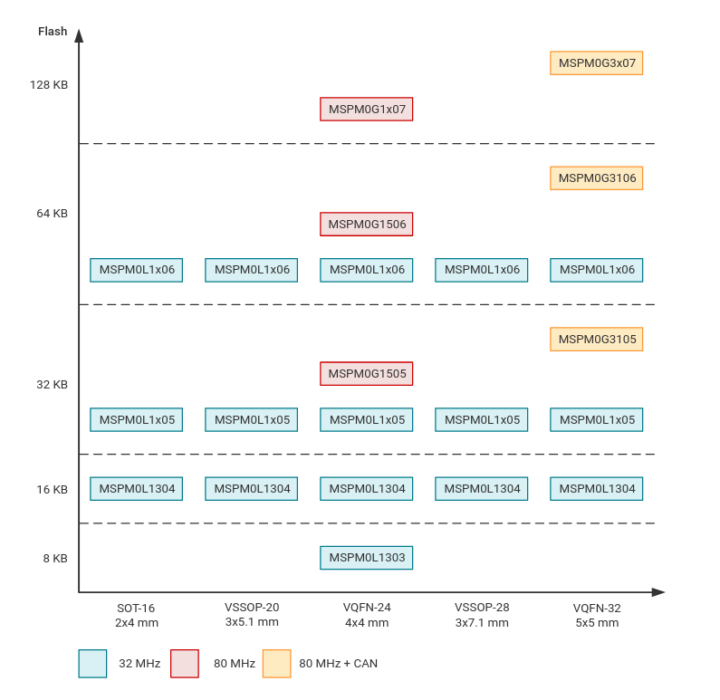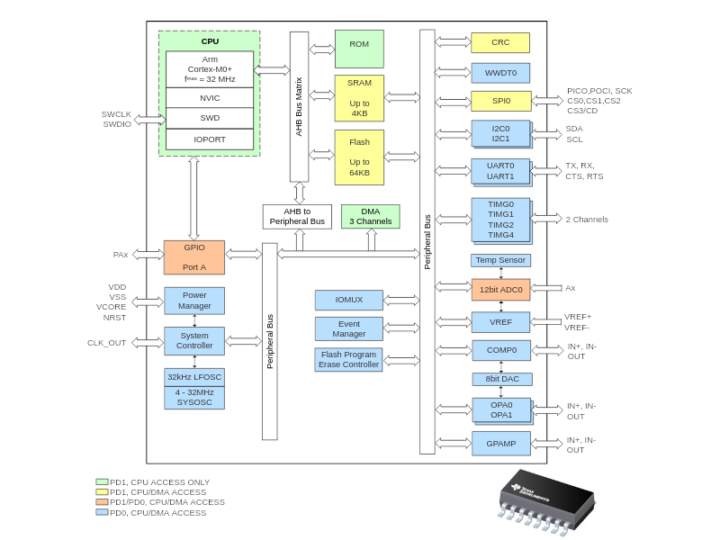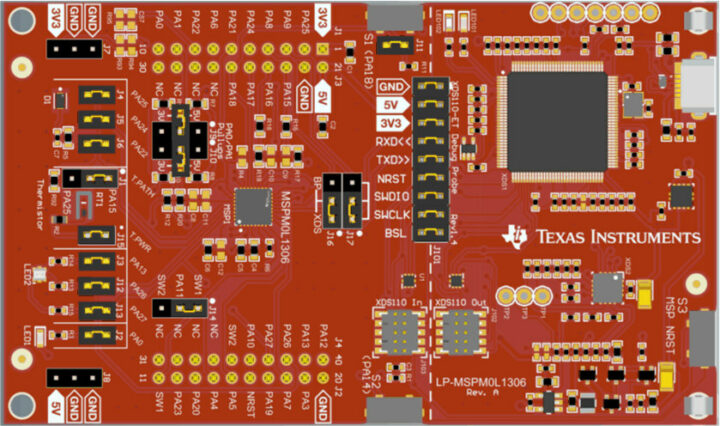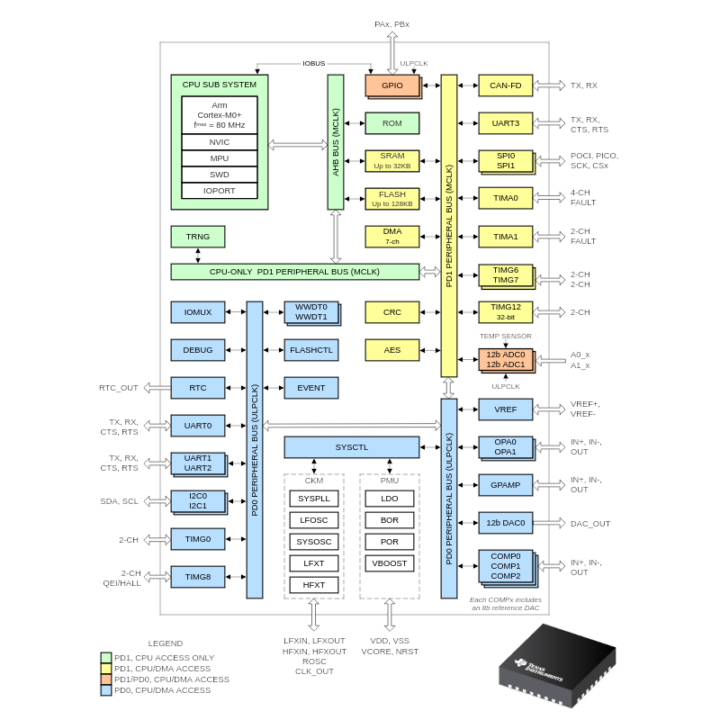Texas Instruments has just introduced its low-cost MSPM0 Arm Cortex-M0+ microcontroller portfolio comprised of the MSPM0L series with a 32 MHz CPU, up to 64 kB of flash, and 4 kB SRAM, and the MSPM0G series with an 80 MHz CPU, up to 128 kB of flash and 32 kB SRAM.
Texas Instruments MSPM0L
MSPM0L1306 key features:
- CPU – Arm 32-bit Cortex-M0+ core @ up to 32 MHz
- Memory – Up to 4KB SRAM
- Storage – Up to 64KB flash
- Digital peripherals
- 3-channel DMA controller
- 4x 16-bit general-purpose timers, each with two capture/compare registers supporting low-power operation in STANDBY mode, supporting a total of 8 PWM channels
- Windowed watchdog timer
- Analog peripherals
- 12-bit 1.45-Msps analog-to-digital converter (ADC) with up to 10 total external channels
- Configurable 1.4-V or 2.5-V internal ADC voltage reference (VREF)
- 2x zero-drift, zero-crossover chopper operational amplifiers (OPA)
- 1x general-purpose amplifier (GPAMP)
- 1x high-speed comparator (COMP) with 8-bit reference DAC
- Integrated temperature sensor
- Communication interfaces
- 2x UART, one supports LIN, IrDA, DALI, Smart Card, Manchester and both support low-power operation in STANDBY mode
- 2x I2C, one supports FM+ (1 Mbit/s) and both support SMBus, PMBus, and wakeup from STOP mode
- 1x SPI up to 16 Mbit/s
- I/O
- Up to 28x GPIOs
- 2x 5-V-tolerant open-drain IOs with fail-safe protection
- Clocks
- Internal 4- to 32-MHz oscillator with up to ±1% accuracy (SYSOSC)
- Internal 32-kHz low-frequency oscillator (LFOSC)
- Data integrity – Cyclic redundancy checker (CRC-16 or CRC-32)
- Debugging – 2-pin serial wire debug (SWD)
- Supply Voltage – 1.62 V to 3.6 V
- Low power modes
- RUN: 96 µA/MHz (CoreMark)
- STOP: 200 µA at 4 MHz and 45 µA at 32 kHz
- STANDBY: 1.1 µA with SRAM retention
- SHUTDOWN: 83 nA with IO wake-up capability
- Packages
- 32-pin VQFN (RHB)
- 28-pin VSSOP (DGS)
- 24-pin VQFN (RGE)
- 20-pin VSSOP (DGS)
- 16-pin SOT (DYY), WQFN (RTR)
- Temperature Range – -40°C to 125°C
Other MSPM0L parts have less memory and storage, and/or various peripheral options:
- MSPM0L13x3: 8KB of flash, 2KB of RAM
- MSPM0L13x4: 16KB of flash, 2KB of RAM
- MSPM0L13x5: 32KB of flash, 4KB of RAM
- MSPM0L13x6: 64KB of flash, 4KB of RAM
Texas Instruments provides the LP-MSPM0L1306 LaunchPad development kit with an on-board debug probe for programming, debugging, and energy measurements, three buttons, two LEDs (one being an RGB LED), an analog temperature sensor, and a light sensor in order to let engineers easily evaluate the 32 MHz MSPM0L microcontrollers. The devkit is supported by the MSP Software Development Kit (SDK).
Texas Instruments MSPM0G
MSPM0G3507 key features:
- CPU – Arm 32-bit Cortex-M0+ core with memory protection unit, up to 80 MHz
- Memory – Up to 32KB of ECC-protected SRAM with hardware parity
- Storage – Up to 128KB of flash memory with error correction code (ECC)
- Digital peripherals
- 7-channel DMA controller
- Math accelerator with support for DIV, SQRT, MAC and TRIG computations
- 7x timers supporting up to 22 PWM channels
- 1x 16-bit general-purpose timer
- 1x 16-bit general-purpose timer supports QEI
- 2x 16-bit general-purpose timers support low-power operation in STANDBY mode
- 1x 32-bit high-resolution general-purpose timer
- 2x 16-bit advanced timers with deadband support up to 12 PWM channels
- 2x window-watchdog timers
- RTC with alarm and calendar mode
- Analog peripherals
- 2x simultaneous sampling 12-bit 4-Msps analog-to-digital converters (ADCs) with up to 17 external channels (14-bit effective resolution at 250-ksps with hardware averaging)
- 1x 12-bit 1-MSPS digital-to-analog converter with integrated output buffer (DAC)
- 2x zero-drift zero-crossover chopper op-amps (OPA)
- 1x general-purpose amplifier (GPAMP)
- 3x high-speed comparators (COMP) with 8-bit reference DACs
- Configurable 1.4-V or 2.5-V internal shared voltage reference (VREF)
- Integrated temperature sensor
- Communication interfaces
- 4x UART interfaces; one supports LIN, IrDA, DALI, Smart Card, Manchester, and three support low-power operation in STANDBY mode
- 2x I2C interfaces support up to FM+ (1 Mbit/s), SMBus/PMBus, and wakeup from STOP mode
- 2x SPI, one SPI up to 32 Mbits/s
- 1x CAN bus interface supporting CAN 2.0 A or B and CAN-FD
- I/O
- Up to 60x GPIOs
- 2x 5-V tolerant IOs
- 2x high-drive IOs with 20-mA drive strength
- Clocks
- Internal 4- to 32-MHz oscillator with up to ±1% accuracy (SYSOSC)
- Phase-locked loop (PLL) up to 80 MHz
- Internal 32-kHz oscillator (LFOSC)
- External 4- to 48-MHz crystal oscillator (HFXT)
- External 32-kHz crystal oscillator(LFXT)
- External clock input
- Data integrity and encryption
- Cyclic redundancy checker (CRC-16, CRC-32)
- True random number generator (TRNG)
- AES encryption with 128- or 256-bit key
- Debugging – 2-pin serial wire debug (SWD)
- Supply Voltage – 1.62 V to 3.6 V
- Low-power modes
- RUN: 96 µA/MHz (CoreMark)
- SLEEP: 200 µA at 4 MHz
- STOP: 50 µA at 32 kHz
- STANDBY: 1.5 µA with RTC and SRAM retention
- SHUTDOWN: 100 nA with IO wake-up capability
- Packages
- 64-pin LQFP
- 48-pin LQFP, VQFN
- 32-pin VQFN
- 28-pin VSSOP
- Temperature Range – -40°C up to 125°C
Against there are more parts with different flash and RAM capacities:
- MSPM0G3505: 32KB flash, 16KB RAM
- MSPM0G3506: 64KB flash, 32KB RAM
- MSPM0G3507: 128KB flash, 32KB RAM
Plus more parts without a CAN Bus interface:
- MSPM0G1505: 32KB flash, 16KB RAM
- MSPM0G1506: 64KB flash, 32KB RAM
- MSPM0G1507: 128KB flash, 32KB RAM
The company also offers the LP-MSPM0G3507 LaunchPad development kit for the 80 MHz Cortex-M0+ microcontroller (sorry, no photo or render) that also works with the MSP Software Development Kit (SDK).
MSPM0 availability and pricing
 Right now I can only find 17 MSPM0 parts on Texas Instruments’ website, but the company says the portfolio will be comprised of around 100 parts by the end of the year. TI did not mention anything about the MSP430 family, as the MSPM0 looks like it could be a replacement.
Right now I can only find 17 MSPM0 parts on Texas Instruments’ website, but the company says the portfolio will be comprised of around 100 parts by the end of the year. TI did not mention anything about the MSP430 family, as the MSPM0 looks like it could be a replacement.
Both the MSPM0L and MSPM0G MCUs are available now with pricing starting at 39 cents in 1,000-unit quantities. Those are not the cheapest Cortex-M0+ microcontrollers around, but still affordable, and in my experience as an engineer, documentation and a large software-compatible portfolio can save a lot of time. Due to limited quantities, the LaunchPad development kits can’t be purchased online at this time, and are only available upon request. More details about the MSPM0 Arm Cortex-M0+ microcontroller family can be found on the product page and the press release.
Thanks to TLS for the tip.

Jean-Luc started CNX Software in 2010 as a part-time endeavor, before quitting his job as a software engineering manager, and starting to write daily news, and reviews full time later in 2011.
Support CNX Software! Donate via cryptocurrencies, become a Patron on Patreon, or purchase goods on Amazon or Aliexpress







